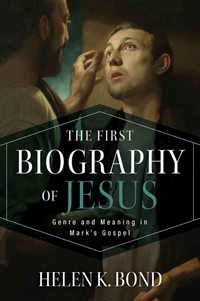The First Biography of Jesus

For the better part of the 20th Century Gospel specialists debated off and on about the genre of the Gospels. An early study in the first decade of the 20th Centurty by Votaw said the Gospels are “biographies” (bioi) but the German form critical school dominated scholarship and argued the Gospels were both not creative presentations but compiling traditions and they are contended the Gospels were unique (low brow literature) and therefore tying them to something so sophisticated as a “biography” would be inaccurate.
So, librarian, where to put these books when they arrive in the mail?
The last couple decades of the 20th Century all but ended that belief by arguing over and over that the Gospels fit best into the genre of biographies, and Richard Burridge sealed the deal.
So what? That’s been a problem because it’s almost as if these debates ended with the conclusionm that they are biographies but then didn’t read Matthew, Mark, Luke or John as biographies. Helen Bond is now presenting the case for reading Mark as a biography in her wonderful new academic book, The First Biography of Jesus.
Her first chp sketches the history briefly mentioned above: from Votaw to Burridge.
First, there was some very early connection of the Gospels to biography when Papias and Justin Martyr each referred to them as “memoirs” and then along came Votaw and exploited the observation with considerable learning.
But it was Karl Ludwig Schmidt and Rudolf Bultmann who argued the case that upended any chance for Votaw thinking the Gospels were biographies. They were instead compilations of traditions with weak joints between traditions and they were not worthy of being called the kind of literature that evokes a genuine Greco Roman biography.

The Jewish literature that might fit here – stuff like Philo’s Life of Moses or even parts of 2 Maccabees or the stories about Abraham in the Bible – just doesn’t get us to the Gospels themselves. It was Hellenistic literature taht shows most connections to what we see in the Gospels.’
In my own career it was Charles Talbert’s What’s a Gospel? that seemed to have turned the discussion toward the kind of full scale work done by Richard Burridge, What are the Gospels?
Critical here is the “genre” is flexible and that what makes a Gospel a biography is that it more or less fits some of the criteria at work in biographies. There is a flexible set of expectations and patterns that lead to the conclusion the Gospels are biographies.
But scholars have not really exploited this and that is what Helen Bond does in this book. Join us for the series.
Here’s the problem that I see for Bond’s book, and I like it a lot. The Gospels were not called “biographies” by their contemporaries and when the church does speak of anything like a “genre” about our first four NT books they call them “gospels.” No one, Bond states right away, ever called them biographies. Why? Because they called them “gospels.” But then she gives too much away (I think) by saying the term “gospel” is “not, of course, a genre.” But why not?, one might ask. It is my conviction that the Gospels are biographies of a sort, they are “evangelistic biographies” or “biographical evangelism” (I don’t mean modern day evangelism), but announcements that this Jesus is the Messiah.
The Gospels were called Gospels because they gospeled the life of Jesus into the gospel! “Gospeling biographies” then. Having said that, it won’t impact what we say about this book because the Gospels are marked by the genre “biography.”
Jesus Creed is a part of CT's
Blog Forum. Support the work of CT.
Subscribe and get one year free.
The views of the blogger do not necessarily reflect those of Christianity Today.


















